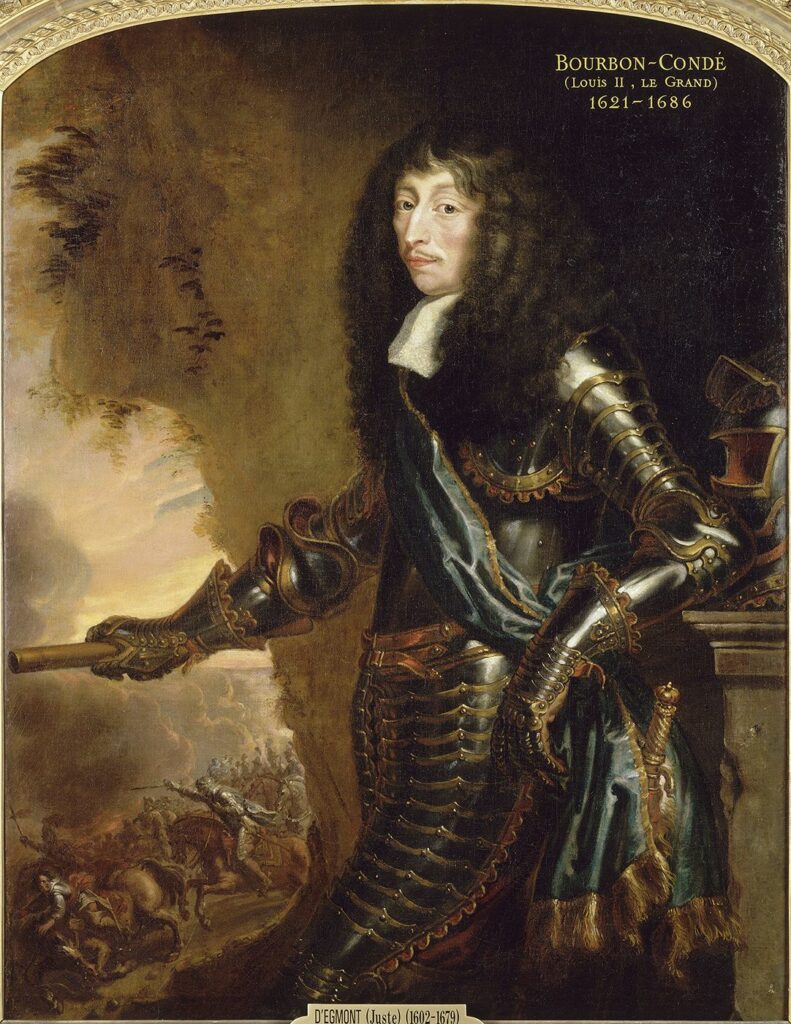
Louis de Bourbon, Prince de Condé, was the cousin of Louis XIV. Famous for his victory at Rocroi, he met Guillaume de Guitaut in 1647 at the siege of Lérida and made him one of his officers. When Condé threw himself into the intrigues of the Fronde, Guitaut did not leave him and it was he who, in 1659, presented the king with the prince’s submission. Between 1668 and 1675, Condé conquered Franche-Comté in three weeks, defeated the Prince of Orange at Seneffe and saved Alsace threatened by the death of Turenne. He ended his life in Chantilly. It was he who had arranged Guitaut’s marriage to the heiress of Epoisses. When she died, she left him her property, which the Prince then returned to Guitaut.
The Great Condé Louis II de Bourbon, Prince de Condé, known as the Great Condé, first prince of the blood, known at first as the Duc d’Enghien, born in Paris in 1621 to Henri II, Prince de Condé, showed a precocious genius in his military career. Appointed general-in-chief at the age of 22 (1643), he completely defeated the numerically superior Spaniards at Rocroy, who were then formidable with their infantry. The following year he defeated the Germans at Freiburg; in 1645 he won the battle of Nordlingen against Mercy, and took Dunkirk in 1646. Less fortunate in Catalonia, he was unable to take Lerida; but he soon afterwards won the victory of Lens in Artois over the Archduke Leopold, which led to peace with Germany (1648). During the troubles of the Fronde, Condé, who had at first defended the court, later took sides against Mazarin. He was then arrested (1650) and detained for thirteen months. As soon as he was free, he thought only of revenge; he raised troops, marched on Paris, and defeated Marshal d’Hocquincourt at Bléneau near Gien; but he was himself beaten by Turenne at the faubourg Saint-Antoine (1652). After this defeat, he passed into the ranks of the Spaniards; but without bringing victory. The Peace of the Pyrenees (1659) returned him to his country of origin. With war reignited between France and Spain, Condé conquered Franche-Comté in three weeks (1668). He also took the most notable part in the war of 1672 against Holland, defeated the Prince of Orange at Senef (1674), and then went to Alsace to defend this province against Montecuculli after the death of Turenne (1675).
He spent his last days in a charming retreat at Chantilly, cultivating letters and conversing with Racine, Boileau, and Molière. He died in 1687. This general owed his success to his irresistible enthusiasm and to happy inspirations, but he did not spare the blood of the soldiers. Bossuet pronounced on his coffin a funeral oration which remained a masterpiece of the genre. Of all the works written about this prince, the most interesting is the Histoire de Louis de Bourbon, by Desormeaux, Paris, 1766-1768.
© 2023 Château d’Epoisses. | All rights reserved
Adresse
1 Rue de Semur, 21460 Époisses, Bourgogne-Franche-Comté
visites@chateaudepoisses.com
03 80 96 40 56